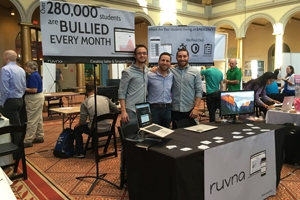Business
Incubating Ideas and Hatching Business Plans

Kogod's Entrepreneurship Incubator opened last fall to provide current students and recent alumni with the tools to cultivate and grow their business ventures.
For Joey Nutinsky, BS/CAS '17, and Maria Rose Belding, BS/CAS '18, the Incubator granted them an opportunity to see their passions become successful startups.
Ruvna
Nutinsky, CEO, along with his business partner Jack Ruppel, CTO, founded ruvna in high school, in response to their experiences with bullying. Ruvna, a program specifically for high school administrators and teachers, manages unruly students by tracking their behavior using a specialized computer system in response to disciplinary actions.
Since joining the Incubator, the founders expanded their team to include Marshall Singer, BSBA '16, and Mike Geddes, BA/SIS '15.
"The Incubator has been instrumental in our success. They provided us with mentorship, experience and confidence needed to turn a few kids that came up with a great piece of technology into a thriving enterprise," said Geddes.
Recently, the team worked on expanding their platform to streamline emergency preparedness. Ruvna's emergency platform provides teachers a faster way to account for students and quickly share data with administration and law enforcement regarding missing students.
"Joey and Jack recognized they needed to build a comprehensive student support system to make schools not only smarter, but safer," said Geddes.
MEANS Database
Passionate about ending hunger, Maria Rose Belding, BS/CAS '18, founded the Matching Excess And Need for Stability (MEANS) Database in an effort to prevent wasting food. She serves as the CEO.
Donors and food pantries in 11 states signed up for MEANS to communicate with each other about donations. Food pantries receive email alerts after a donor posts a contribution and accepts or ignores the donation based on their current inventory.
Allowing food pantries to control their supplies provides an opportunity to maximize food resources and gather data. Focused on gaining access to more data, Belding and her team at the Incubator aim to create a predictive model for emergency planning.
"Working in the Incubator has been incredibly helpful for us as a venture,” said Belding. “We’re able to meet with our interns, have full meetings and bounce ideas off other social innovators and the professors."
In a constantly changing world, these students took advantage of the technology wave in order to create and communicate effective change. To learn more about AU’s Entrepreneurship Incubator along with its current ventures, visit the website.
